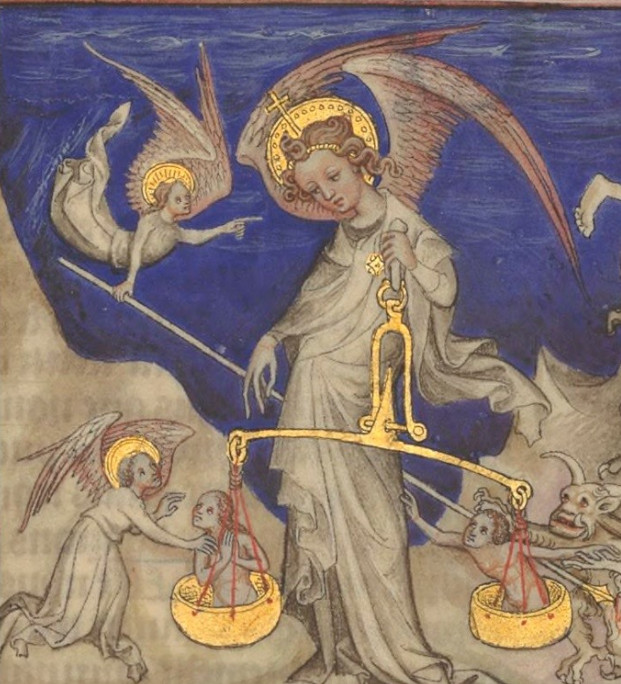I am most grateful for the comments generated by my previous post. I have been musing about why not judging others seems to be a stumbling block. Perhaps, it is because we consider the spiritual life in the absolutist, rational categories of right and wrong or guilt and innocence, rather than in terms of healthy, living communion with God and diseased, deadening alienation from Him or radiant, grace-attracting humility and darkened, grace-repelling pride. Judgment demands that the guilty be punished and wrongs be righted. Compassion seeks for the sick to be healed and the proud to be humbled. Judgment divides me from my brother as separate and different from me. Compassion unites us as being one in need of a merciful God.
In a somewhat startling passage, Saint Isaac the Syrian writes,
“Justice does not belong to the Christian way of life and there is no mention of it in Christ’s teachings…. How can you call God just, when you come across the Scriptural passage on the wages given to the workers? "Friend, I did not wrong you: I chose what to give to this latecomer, just as I had chosen what to give to you. Or is your eye perhaps evil because I am good?’"How can a man call God just when he comes across the passage on the prodigal son who wasted his wealth with riotous living, how, for the compunction alone which he showed, the father ran and fell upon his neck and gave him authority over all his wealth… Where, is God’s justice, for while we are the sinners, Christ died for us?” (Homily 51).
As Christians, we should be concerned with being merciful around others rather than with judging them. And this can take place only if our spiritual eyes are not evil, but pure and simple, as are the spiritual eyes of those who are united to God with humble prayer ceaselessly being offered up for all, as incense, before the ever-merciful and forgiving Lord.
In the Orthodox Church, today is the Sunday of the tax-collector ("Publican") and the Pharisee. The Gospel for the day introduces this parable by noting: “And He spoke this parable to certain youths, who trusted in themselves that they were righteous, and they despised others.” There are two kinds of misjudgment at work here. The presumption of being righteous when one is not, and the presumption that others are unrighteous when they are in fact justified before God through their repentance.
As to the first misjudgment, in a fallen state, our ego strives to preserve an idealized, but inaccurate self-concept about what “good and upstanding” people we are, telling us that: “We pray. We go to church. We take care of our family. We don’t cheat anyone. We are essentially good persons.” And yet we usurp this goodness as though it is ours through our own efforts, apart from God and the only source of that which is genuinely good. And we allow this seeming goodness to become a cloak that obscures our other sins and failings for which we should repent.
As to the second misjudgment, if our judgment about someone else is wrong, we not only judge, but also slander. If our judgment is correct, we still may be in danger of separating ourselves from others, of thinking of ourselves as being better than they are, of becoming unwittingly self-righteous, and of failing to love our enemies.
In an earlier post, I wrote, “And lo, Zachaeus’s self-concept changed radically from that blessed meeting with the Lord. He understood himself now in terms of God’s compassionate understanding of Zachaeus that in turn made Zachaeus all the more compassionate towards others.” When one’s attention descends into the heart in humble prayer, believers begin to see themselves in relation to God and their abiding need and desire for purification and illumination. Such an awareness leaves little room for judging others.
In response to a recent blog comment, I wrote, “I think your statement “holding people accountable when the relationship warrants it” is important. There are many cases when the relationship does not warrant it. And outside of the clear examples of parents and their young children as well as priests and their flocks, it is best to be wary of what we should hold others to. Loving unconditionally is certainly unconditional, as is holding ourselves accountable to others and to God.
As far as the accounts of others are concerned, however, we tread carefully and lovingly if we tread at all. No there are no easy answers, but the heart can sense when what is being done or said is being done from love with kindness and compassion. Simplicity is, of course, a great virtue. Those monks who literally managed to not judge anyone, to hold no one to account for anything, were simple, guileless souls that reached salvation to a large extent by their refusal to ever judge anyone and by their commitment to always judge themselves. The result was an abyss of humility and from humility an abundance of holiness. Of course, simple monks have such a luxury. But for those whose circumstances allow it, such a way is truly blessed.”
When we are engaged in the spiritual struggle or when we recognize the great gift inherent in the prayer of the tax collector, we cease to search for circumstances or conditions in which we are really justified in judging our brother. Remembrance of God, vigilance in matters of the heart, and the striving for humility leave little room for those types of pursuits.
When we pray with the humility and honesty of the tax collector we recognize that the temptation to judge others is nothing more than a fool’s errand, taking us off course and onto crooked and perverse paths that lead us away from our ultimate goal, the love of our merciful Savior who “makes His sun to rise on the evil and on the good, sends rain on the just and on the unjust,” and promises that those who judge not will not be judged.

Orthodox Outlet for Dogmatic Enquiries Orthodox Psychotherapy
Justice Does Not Belong to the Christian Way of Life
"Do not judge, lest you be judged; for, in that which you judged, in that you shall be judged,
and in the way that you measured, in that way you shall be measured." (Matth.7:1-2)
|
|

